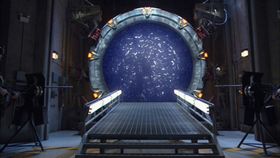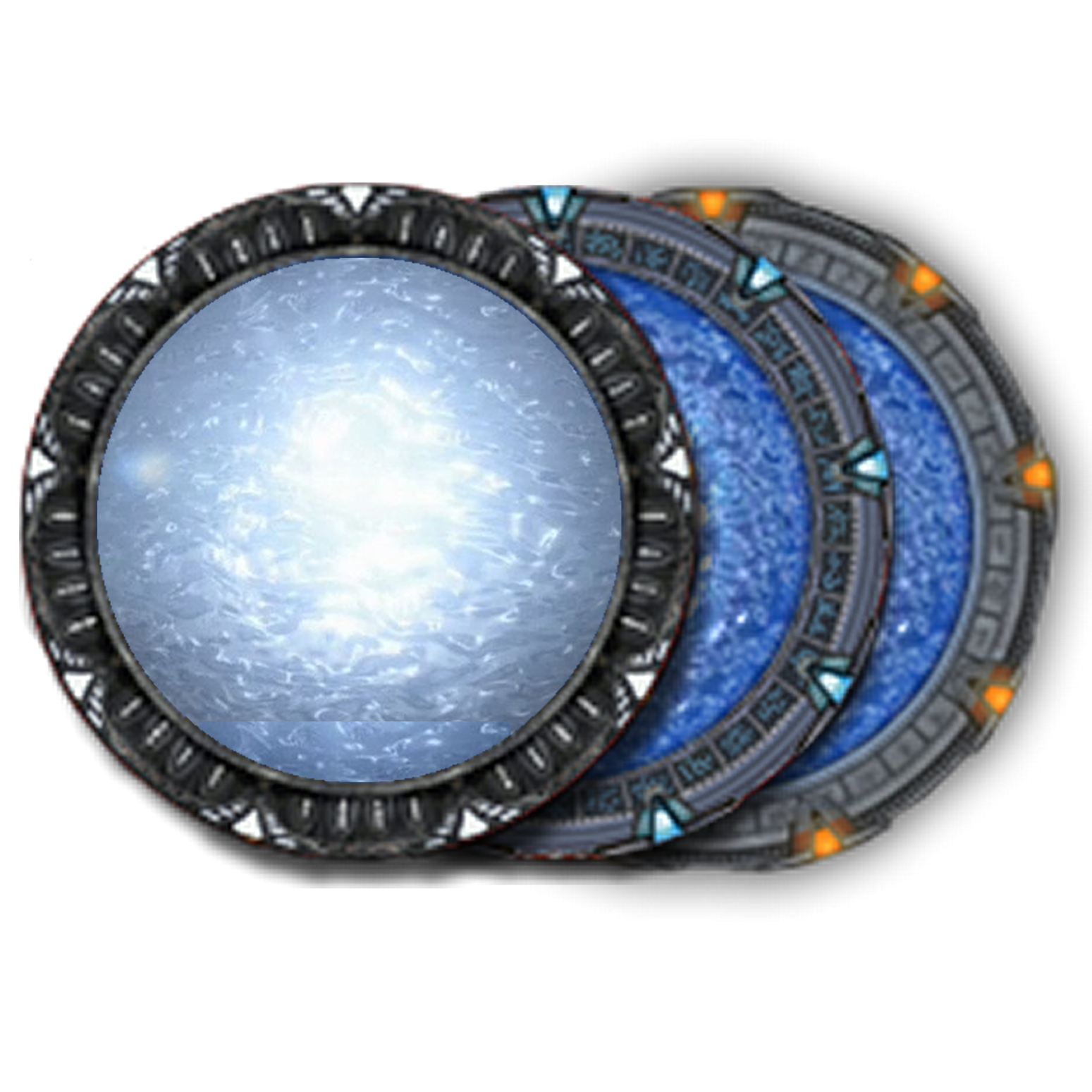Stargate franchise: Difference between revisions
(Created page with "{{Infobox Media franchise | title = Stargate | rtitle = | image = Stargate (Unending).jpg | imagesize = 280 | caption = An active Star...") |
No edit summary |
||
| Line 31: | Line 31: | ||
| otherdata3 = | | otherdata3 = | ||
}} | }} | ||
'''''Stargate''''' is an [[w:Adventure science fiction|adventure]] [[w:military science fiction|military science fiction]] '''franchise''', initially conceived by [[Roland Emmerich]] and [[Dean Devlin]]. The first film in the franchise was simply titled ''[[Stargate (movie)|Stargate]]''. It was originally released on October 28, 1994, by [[Metro-Goldwyn-Mayer]], [[Carolco]] and [[Studio Canal]], and became a hit, grossing nearly $200 million (USD) worldwide.<ref name="estimated">{{cite web|author=|url=http://boxofficemojo.com/movies/?id=stargate.htm |title=Stargate (1994) |publisher=''''Box Office Mojo'' | accessdate=2011-04-27}}</ref><ref name="estimated2">{{cite web|author=|url=http://www.the-numbers.com/movies/1994/0SGTE.php|title=Movie Stargate - Box Office Data, News, Cast Information - The Numbers|publisher=Nash Information Services, LLC}}</ref> Three years later, [[Brad Wright]] and [[Jonathan Glassner]] created a television series titled ''[[Stargate SG-1]]'' as a sequel for the film. | |||
In addition to film and television, the ''Stargate'' franchise has expanded into other media, including [[Portal:Romans|books]], video games, and [[Portal:Comics|comic books]]. These supplements to the film and television series have resulted in significant development of the show's fictional universe and mythology. In 2008, the films ''[[Stargate: The Ark of Truth]]'' and ''[[Stargate: Continuum|Continuum]]'' were released [[wikipedia:direct-to-DVD|direct-to-DVD]], which in total grossed over $21 million in the United States. In 2002 the franchise's first animated series, ''[[Stargate Infinity]]'', began airing, which holds no canonicity in the franchise despite its ''[[Stargate SG-1]]''-inspired plot. In 2004, the TV series ''[[Stargate Atlantis]]'' was released as a spin off from ''Stargate SG-1'' and a third series, ''[[Stargate Universe]]'', premiered on October 2, 2009. ''Stargate Universe'' was cancelled during its second season, leaving it on a cliffhanger. Then on April 17, 2011, Stargate producer Brad Wright announced that any plans for the continuation of the franchise had been cancelled indefinitely, ending 17 years of Stargate television production.<ref name="Colvin">{{Cite news |first=Chad | last=Colvin |title=SGU continuation, other movies dead — for now |url=http://www.gateworld.net/news/2011/04/wright-sgu-continuation-other-movies-dead-for-now/ |format= |agency=|work=GateWorld |date=April 17, 2011|accessdate=April 17, 2011}}</ref> | |||
== Premise == | |||
''Stargate'' productions center on the premise of a "[[Stargate]]", a ring-shaped device that creates a [[wormhole]] enabling personal transportation to complementary devices located cosmic distances away. Under the control of the United States government, the Stargate discovered on Earth is kept a secret from the public. This allows for storylines to present [[wikipedia:suspension of disbelief|no contradiction]] between depicted events and [[wikipedia:reality|reality]], an effect compounded by setting ''Stargate'' in the [[wikipedia:present day|present day]] and depicting Earth accurately, with any unrealistic technology originating solely from alien civilizations. These extraterrestrial civilizations are typically more pre-industrial than scientifically advanced and are almost always human. Together, this allows for stories predominated by human interaction in Earth-like environments, an unusual feature for a science fiction franchise focused on exploration of other worlds. | |||
In the story, this is explained as being the result of alien interference in Earth's distant past—the concept influenced by the theories of [[wikipedia:Erich von Däniken|Erich von Däniken]].<ref>{{cite web|url= | |||
http://www.zoozle.co.za/news/?article=2011-03-19-is-there-a-stargate |title=Roland Emmerich's Stargate film based on Erich von Daniken's research |publisher=Zoozle news |accessdate=March 19, 2011}}</ref> Many ancient [[mythology|mythologies]] are shown to be the result of aliens who had visited Earth posing as gods by using their technology to give the impression of deific power. While some of these aliens had benign intentions, a race later known in ''Stargate SG-1'' as the "[[Goa'uld]]" used Stargates to move slaves from [[Ancient Egypt]] to other habitable planets, simultaneously being responsible for the Egyptian religion and culture. Following a successful rebellion, the Goa'uld fled Earth, and the Stargate was buried and forgotten until modern times, when the United States acquired it following an archaeological dig. With the rediscovery of the function of the Stargate, the galaxy becomes a source of knowledge as well as threats, and the attention of the Goa'uld is drawn once more to Earth. | |||
Revision as of 13:31, 31 January 2016
| Stargate | |
 An active Stargate, the main device used in the franchise. | |
| Creator | Roland Emmerich, Dean Devlin |
|---|---|
| Original work | Stargate |
| Print publications | |
| Novels | Novels |
| Comics | Comics |
| Films and television | |
| Films | Stargate Stargate: The Ark of Truth Stargate: Continuum |
| Television series | Stargate SG-1 Stargate Atlantis Stargate Universe |
| Animated series | Stargate Infinity |
| Games | |
| Role-playing | Stargate SG-1 Roleplaying Game |
| Video games | Stargate: Resistance |
Stargate is an adventure military science fiction franchise, initially conceived by Roland Emmerich and Dean Devlin. The first film in the franchise was simply titled Stargate. It was originally released on October 28, 1994, by Metro-Goldwyn-Mayer, Carolco and Studio Canal, and became a hit, grossing nearly $200 million (USD) worldwide.[1][2] Three years later, Brad Wright and Jonathan Glassner created a television series titled Stargate SG-1 as a sequel for the film.
In addition to film and television, the Stargate franchise has expanded into other media, including books, video games, and comic books. These supplements to the film and television series have resulted in significant development of the show's fictional universe and mythology. In 2008, the films Stargate: The Ark of Truth and Continuum were released direct-to-DVD, which in total grossed over $21 million in the United States. In 2002 the franchise's first animated series, Stargate Infinity, began airing, which holds no canonicity in the franchise despite its Stargate SG-1-inspired plot. In 2004, the TV series Stargate Atlantis was released as a spin off from Stargate SG-1 and a third series, Stargate Universe, premiered on October 2, 2009. Stargate Universe was cancelled during its second season, leaving it on a cliffhanger. Then on April 17, 2011, Stargate producer Brad Wright announced that any plans for the continuation of the franchise had been cancelled indefinitely, ending 17 years of Stargate television production.[3]
Premise
Stargate productions center on the premise of a "Stargate", a ring-shaped device that creates a wormhole enabling personal transportation to complementary devices located cosmic distances away. Under the control of the United States government, the Stargate discovered on Earth is kept a secret from the public. This allows for storylines to present no contradiction between depicted events and reality, an effect compounded by setting Stargate in the present day and depicting Earth accurately, with any unrealistic technology originating solely from alien civilizations. These extraterrestrial civilizations are typically more pre-industrial than scientifically advanced and are almost always human. Together, this allows for stories predominated by human interaction in Earth-like environments, an unusual feature for a science fiction franchise focused on exploration of other worlds.
In the story, this is explained as being the result of alien interference in Earth's distant past—the concept influenced by the theories of Erich von Däniken.[4] Many ancient mythologies are shown to be the result of aliens who had visited Earth posing as gods by using their technology to give the impression of deific power. While some of these aliens had benign intentions, a race later known in Stargate SG-1 as the "Goa'uld" used Stargates to move slaves from Ancient Egypt to other habitable planets, simultaneously being responsible for the Egyptian religion and culture. Following a successful rebellion, the Goa'uld fled Earth, and the Stargate was buried and forgotten until modern times, when the United States acquired it following an archaeological dig. With the rediscovery of the function of the Stargate, the galaxy becomes a source of knowledge as well as threats, and the attention of the Goa'uld is drawn once more to Earth.
- ↑ "Stargate (1994)". ''Box Office Mojo. Retrieved 2011-04-27.
- ↑ "Movie Stargate - Box Office Data, News, Cast Information - The Numbers". Nash Information Services, LLC.
- ↑ Colvin, Chad (April 17, 2011). "SGU continuation, other movies dead — for now". GateWorld. Retrieved April 17, 2011.
- ↑ "Roland Emmerich's Stargate film based on Erich von Daniken's research". Zoozle news. Retrieved March 19, 2011.

